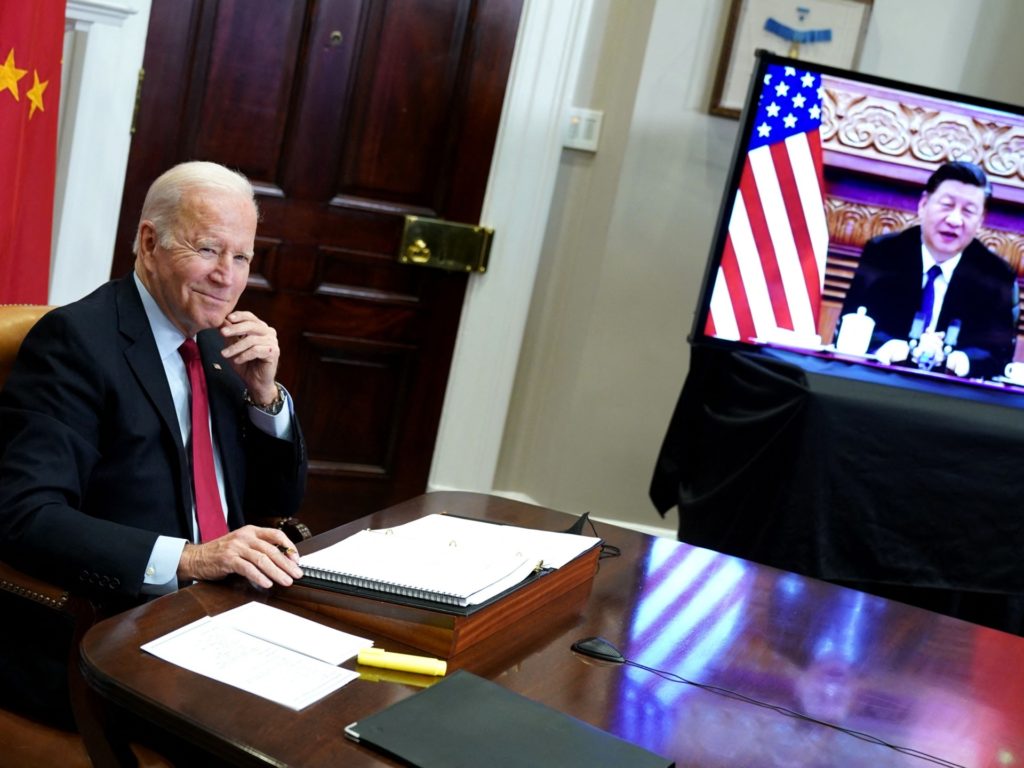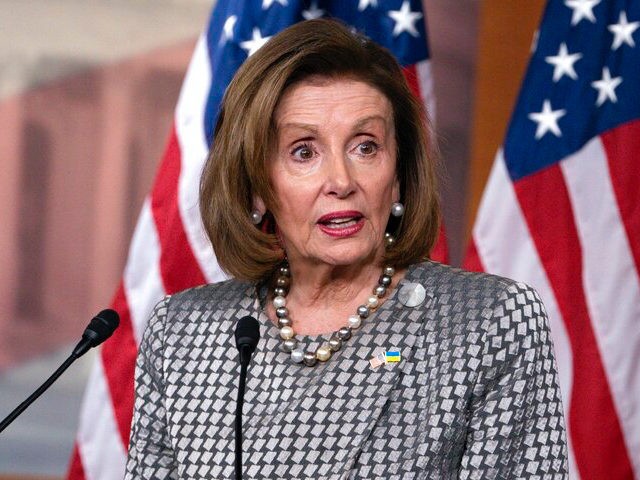House Speaker Nancy Pelosi (D-CA) — a long-time critic of the Chinese Communist Party — began her trip to Asia on Sunday but did not confirm if she would visit Taiwan and become the highest-ranking U.S. official to visit in 25 years.
Beijing has threatened consequences if Pelosi flies to Taiwan, and the Biden administration opposes the trip out of concern it will prompt some sort of military confrontation with China or further destabilize the relationship.
The last time a U.S. official of her status visited Taiwan was in 1997, and the official was then-House Speaker Newt Gingrich (R-GA). Gingrich has urged Pelosi to go despite the Biden administration’s opposition, calling it “timidity, covered by insecurity and an eagerness to appease people who aren’t Americans.”
“You have a woke Defense Department which is as timid as the State Department, which is really dangerous,” Gingrich said at the America First Policy Institute summit last week in Washington, DC.
A number of other Republicans are also urging Pelosi to go and not back down to Beijing, including Sen. Rick Scott (R-FL), who visited Taiwan this month.
“China is just a belligerent country with some wonderful people, but horrible government. And so, we’ve gotta stand up for our great ally — not just Taiwan, but … when we do this, we’re supporting Japan. We’re sort of supporting South Korea and other allies in the Asias,” he told Breitbart News.
Sen. Tammy Duckworth (D-IL), a double amputee, visited Taiwan for the second time in May.
Beijing — an authoritarian regime — claims Taiwan as its territory, despite Taiwan having its own government since Chinese nationalists fled to the island in 1949 after a civil war
Today, Taiwan is a thriving democracy of 23 million citizens and an economy that ranks around the 20th largest in the world. It considers itself a separate country, but China has vowed to “reunite” Taiwan under its control, including by force.
Although the U.S. cut formal diplomatic ties with Taiwan when it normalized relations with China in 1979 as part of its “one China policy,” Washington maintains a robust informal diplomatic relationship with Taiwan and strongly opposes a military invasion of Taiwan by China.
However, the U.S. has tried to maintain “strategic ambiguity” over the question of military intervention — where it has not clarified outright if it would defend Taiwan militarily if China invades, in a balancing act intended to placate China but also deter any invasion.
President Joe Biden has said multiple times that the U.S. would come to Taiwan’s aid militarily if China invades, but White House officials have immediately walked his comments back — leaving it unclear what the Biden administration would actually do.
Under current Chinese President Xi Jinping, China has dramatically stepped up its military and diplomatic bullying of Taiwan — flying record numbers of military sorties around the island and peeling off Taiwan’s official diplomatic allies with promises of economic development. Some experts believe that China could seek to invade Taiwan as early as 2027, which could prompt a U.S. military confrontation with Chinese forces.
In the meantime, Taiwan has doubled down on building its defense capabilities and sought to bolster its informal and formal diplomatic relations with other democratic nations, including the U.S., other nations in the region such as Japan, as well as Eastern Europe. Taiwan has donated humanitarian aid to the people of Ukraine as they face an ongoing invasion from Russia.
Taiwan has also highlighted its role in warning the world of COVID-19 after the virus originated from Wuhan in China and Chinese officials tried to stop information about the infectious disease from getting out — costing the world precious time to react and letting it spread to the U.S. and around the world.
Michael Pillsbury, author of The Hundred-Year Marathon: China’s Secret Strategy to Replace America as the Global Superpower and considered the nation’s leading authority on China by former President Donald Trump, told Breitbart News in an email on Sunday:
We need a Congressional review of the one China policy. It appears China’s expanding the definition that not only does Taiwan belong to China, but China can dictate which U.S. government officials and members of Congress are allowed to visit Taiwan.
As you recall, quite a few American officials have now been ‘sanctioned’ for violating Chinese sovereignty because of their visits to Taiwan. This was not the original one China policy agreement.
Pillsbury added that the One China policy has “never actually been submitted as a document or treaty to the U.S. Congress,” and the U.S. has taken a stricter interpretation than necessary.
“My impression is members of Congress have only a very limited understanding of what was agreed to first by Henry Kissinger and later by Jimmy Carter. We started as early as 1970s with self-imposed restrictions,” he said.
Dean Cheng, senior research fellow at the Heritage Foundation’s Asian Studies Center, also said Pelosi should not back down to Beijing.
“Yes, Speaker Pelosi should go to Taiwan (and apparently is there now),” he said in an email response to Breitbart News Monday. “It is vital to make clear to Beijing that it does not have the ability to dictate where American diplomats, officials, and politicians go.”
“Chinese Communist Party (CCP) leaders clearly feel that they have the right to dictate to other states how to behave, while insisting that any criticism of China is tantamount to interfering in China’s internal affairs,” he said, adding:
More to the point, Beijing has long insisted that the United States join China in the strategic, political, and diplomatic isolation of Taiwan. It has protested just about every arms sale to Taiwan, on the grounds that no one has the right to arm the “renegade province.”
For Speaker Pelosi to accede to Chinese demands sets the stage for Chinese demands to halt arms sales as well. That the Biden administration has only cleared small service agreements (to help Taiwan maintain its current weapons) is a bad sign, raising questions of what the Biden administration is ultimately planning on doing with regards to aiding Taiwan’s defense.

U.S. President Joe Biden meets with China’s President Xi Jinping during a virtual summit from the Roosevelt Room of the White House in Washington, DC, November 15, 2021. (Photo by MANDEL NGAN/AFP via Getty Images)
Gingrich, who said his trip to Taiwan came at a fraught time and was strongly opposed by Beijing, urged Pelosi to show strength, not weakness. He scoffed at suggestions that China would try to interfere with Pelosi’s trip, such as by intercepting her plane. Chinese officials have threatened to shoot it down.
“Well, my first suggestion is this — if the Department of Defense is not certain that they can protect an American speaker of the House in a public visit, why would we think they could protect Taiwan?” Gingrich said.
“And if you’re the Chinese Communists, and you [watched] the total mess in Afghanistan, the total mess in Ukraine, you begin to think this administration is just begging to be bullied. … On this one, I think she had her instincts right. I hope she sticks to her guns,” he said.
The trip is likely the last chance Pelosi will have to visit Taiwan as House Speaker. Republicans are widely expected to take back the House this November, and there is rampant speculation that Pelosi, who is 82, will retire at the end of her current term. The trip would cement her legacy as a speaker who was not afraid to offend China.
According to Pelosi’s office, she will be visiting Singapore, Malaysia, South Korea, and Japan on her trip. Traveling with her are five Democrats, although she had invited House Foreign Affairs Committee Ranking Member Michael McCaul (R-TX), who declined to go.
“Today, our Congressional delegation travels to the Indo-Pacific to reaffirm America’s strong and unshakeable commitment to our allies and friends in the region,” Pelosi said in her statement.
Follow Breitbart News’s Kristina Wong on Twitter or on Facebook.

COMMENTS
Please let us know if you're having issues with commenting.